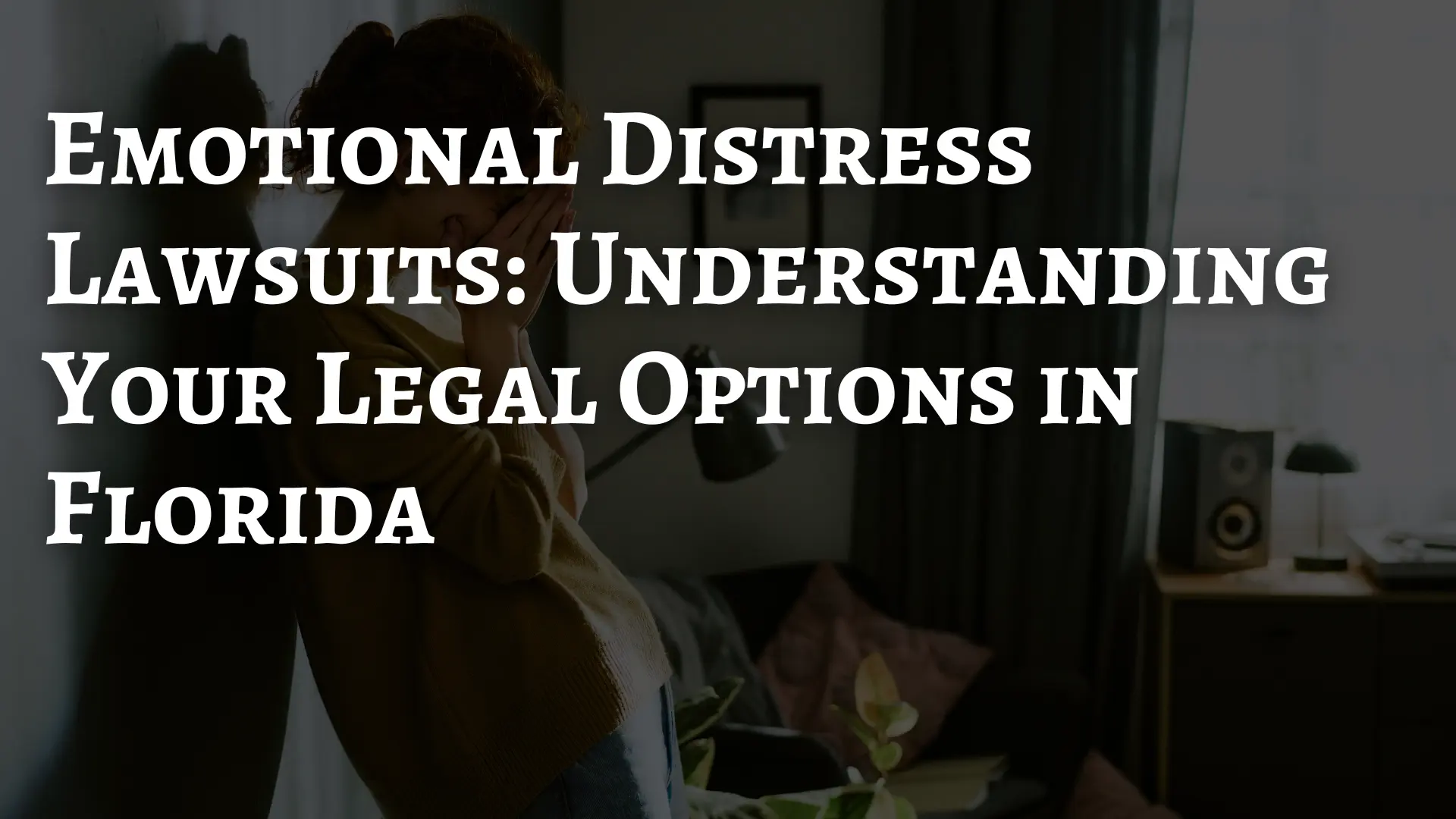
If you’ve suffered emotional distress due to someone else’s actions or negligence, The Bruner Law Firm is ready to help. Our personal injury lawyers understand the nuances of Florida emotional distress lawsuits and know how to build compelling cases that demonstrate the severity of your psychological harm. With offices throughout Florida, our personal injury attorneys and team members are committed to advocating for your rights.
What Constitutes Emotional Distress in a Lawsuit?
Emotional distress refers to psychological harm or mental anguish that results from another party’s actions or negligence. Unlike physical injuries, emotional distress involves damage to your mental health, well-being, and emotional state. Florida law recognizes emotional distress as a valid basis for legal claims when specific conditions are met.
The state distinguishes between two primary categories of emotional distress claims. Intentional infliction of emotional distress occurs when someone deliberately engages in extreme and outrageous conduct that causes severe emotional harm. Negligent infliction of emotional distress happens when someone’s careless actions result in psychological injury to another person.
Common examples of situations that may qualify for emotional distress claims include witnessing a traumatic accident, experiencing workplace harassment, enduring medical malpractice, or losing a loved one due to someone else’s wrongful actions. The key factor is that the emotional harm must be severe and directly connected to the defendant’s conduct. Understanding these distinctions is crucial when pursuing personal injury claims in Florida.
Types of Emotional Distress Claims
Florida law recognizes several distinct types of emotional distress claims, each with its own legal requirements and standards of proof.
Intentional Infliction of Emotional Distress (IIED) involves deliberate conduct that is extreme and outrageous. This type of claim requires proving that the defendant acted with intent to cause emotional distress or with reckless disregard for the likelihood of causing such harm. Examples include severe workplace harassment, threats, or abusive behavior that goes far beyond what society considers acceptable. These cases often require the expertise of experienced personal injury attorneys who understand Florida’s strict standards.
Negligent Infliction of Emotional Distress (NIED) occurs when someone’s negligent actions cause psychological injury. This claim doesn’t require proof of intent but does require showing that the defendant owed you a duty of care, breached that duty, and caused your emotional distress as a result. Under Florida’s “Impact Rule,” NIED claims generally require that the emotional distress result in physical injury or physical manifestation. Motor vehicle accidents and medical malpractice cases often involve NIED claims, particularly when physical injury accompanies the psychological harm. If you’ve been injured in a car accident, our car accident lawyers can evaluate your emotional distress claim.
Bystander emotional distress claims apply when you witness a traumatic event involving a close family member. Florida law allows certain bystanders to recover damages for emotional distress caused by witnessing a loved one’s injury or death. However, under Florida’s “Impact Rule,” bystanders must suffer a discernible physical injury or manifestation resulting from the emotional shock—purely psychological injuries are not recoverable for bystanders. Examples of qualifying physical manifestations include shock-induced illness or a heart attack resulting from witnessing the traumatic event. These complex cases often arise in wrongful death situations.
Elements Required to Prove Emotional Distress
Successfully pursuing an emotional distress lawsuit requires establishing several key legal elements. Your attorney must demonstrate each element to build a strong case.
First, you must show that the defendant’s conduct was extreme and outrageous. This means the behavior exceeded all bounds of decency and was utterly intolerable in a civilized society. Ordinary rudeness, insults, or even bad behavior typically don’t meet this threshold. Our personal injury litigation team has extensive experience establishing this critical element.
Second, you need to establish causation—a direct connection between the defendant’s conduct and your emotional distress. This requires showing that the defendant’s actions directly caused your psychological harm, not some other factor or pre-existing condition. This is where medical documentation becomes essential.
Third, you must prove the severity of your emotional distress. This isn’t about minor upset or temporary sadness. The distress must be severe enough to substantially interfere with your daily functioning, relationships, work, or health.
Finally, you need solid documentation and evidence supporting your claim. Medical records, psychological evaluations, therapy notes, and expert testimony all play crucial roles in establishing the extent and severity of your emotional distress. Our attorneys work with medical and psychological experts to build compelling evidence.
Damages Available in Emotional Distress Cases
Florida law allows recovery of various types of damages in successful emotional distress cases, helping compensate you for the harm you’ve suffered.
Compensatory damages cover the actual costs associated with your emotional distress. This includes medical and psychological treatment expenses, therapy sessions, medications, and any other healthcare costs directly related to your condition. Knowing how to maximize your personal injury settlement can help you recover these costs.
Lost wages and income compensation cover earnings you lost due to your emotional distress. If your condition prevented you from working or required time off for treatment, you can recover those lost wages. Learn more about how to claim lost wages from a car accident and other incidents. This is a critical component of personal injury damages.
Pain and suffering damages address the non-economic harm you experienced. This includes compensation for your emotional anguish, mental suffering, loss of enjoyment of life, and the impact on your relationships and daily activities. These damages are often the largest component of emotional distress settlements.
Punitive damages may be available in cases involving intentional infliction of emotional distress. These damages go beyond compensating you for your losses and instead serve to punish the defendant for particularly egregious conduct and deter similar behavior in the future. Understanding common defenses in personal injury lawsuits can help you prepare for trial.
Common Scenarios Leading to Emotional Distress Claims
 Emotional distress claims arise in various contexts where someone’s actions or negligence cause significant psychological harm.
Emotional distress claims arise in various contexts where someone’s actions or negligence cause significant psychological harm.
Workplace harassment and discrimination frequently lead to emotional distress claims. Severe, ongoing harassment based on protected characteristics, hostile work environments, or retaliation can cause substantial emotional harm. If you’ve experienced workplace injuries or harassment, our team can help.
Motor vehicle accidents often involve emotional distress claims, particularly when the accident causes serious injury or death to a loved one. The trauma of witnessing or experiencing a serious accident can result in lasting psychological effects.
Medical malpractice situations may include emotional distress claims when a healthcare provider’s negligence causes injury or fails to diagnose a serious condition, resulting in psychological harm to the patient or their family. Medical malpractice claims require specialized knowledge of healthcare standards.
Wrongful death circumstances frequently involve emotional distress claims by family members who suffer psychological trauma from losing a loved one due to someone else’s negligence or intentional conduct.
How to Document Your Emotional Distress
Proper documentation is essential for supporting your emotional distress claim and demonstrating the severity of your condition to the court.
- Medical records and psychological evaluations provide objective evidence of your emotional distress. These documents from licensed mental health professionals establish the diagnosis, severity, and treatment of your condition.
- Therapy and treatment documentation show the ongoing nature of your emotional distress and the steps you’ve taken to address it. Regular therapy notes, treatment plans, and progress reports all strengthen your claim.
- Witness statements from family members, friends, coworkers, or others who observed changes in your behavior, mood, or functioning can corroborate your claims about the impact of your emotional distress. These statements strengthen your case significantly.
- Personal journals and records documenting your emotional state, symptoms, and how the distress affects your daily life provide compelling evidence of your experience. These contemporaneous records often carry significant weight in legal proceedings.
Frequently Asked Questions About Emotional Distress Lawsuits
How long do I have to file an emotional distress lawsuit in Florida?
Florida’s statute of limitations for emotional distress claims is generally two years from the date the injury occurred (for incidents occurring after March 24, 2023). Prior to March 24, 2023, the statute of limitations was four years. This timeline can vary depending on the specific circumstances of your case and the type of claim involved. It’s important to consult with an attorney promptly to ensure you don’t miss the deadline for filing your claim. For more information, see our guide on how long you have to file a personal injury lawsuit in Florida.
Can I sue for emotional distress without physical injury?
The answer depends on the type of emotional distress claim. For Intentional Infliction of Emotional Distress (IIED) claims, you may be able to pursue recovery for severe emotional distress without physical injury when the defendant’s conduct is extreme and outrageous. However, for Negligent Infliction of Emotional Distress (NIED) claims, Florida’s “Impact Rule” generally requires that the emotional distress result in physical injury or physical manifestation. Additionally, bystander emotional distress claims require a discernible physical injury or manifestation resulting from the emotional shock. It’s essential to consult with an attorney to understand which type of claim applies to your situation and what evidence you’ll need to support your case.
What evidence do I need to prove emotional distress?
You’ll need medical and psychological records, treatment documentation, expert testimony, witness statements, and personal records demonstrating the severity and impact of your emotional distress. The specific evidence required depends on your case’s circumstances and the type of claim you’re pursuing.
How much compensation can I receive for emotional distress?
Compensation varies widely based on factors including the severity of your distress, the extent of treatment required, lost wages, the defendant’s conduct, and other case-specific circumstances. There’s no fixed formula, and amounts can range from modest to substantial depending on your situation.
Get Help With Your Emotional Distress Claim
The Bruner Law Firm brings extensive experience handling personal injury claims throughout Florida, including complex emotional distress cases. Our legal team understands the nuances of Florida emotional distress law and knows how to build compelling cases that demonstrate the severity of your psychological harm. Read what our clients have shared in their testimonials and explore some of our case results to see the outcomes we’ve achieved for people facing similar challenges.
We recognize that emotional distress claims require careful documentation and skilled presentation to succeed. Our personal injury attorneys work with medical and psychological experts to establish the connection between the defendant’s conduct and your emotional harm. We’re committed to advocating for your rights and pursuing the compensation you deserve.
If you’ve suffered emotional distress due to someone else’s actions or negligence, The Bruner Law Firm is ready to help. We offer free consultations to discuss your situation and explain your legal options. Contact us at (850) 243-2222 to discuss your emotional distress claim. Our team throughout Florida is standing by to assist you.
Related Posts
- Understanding the Difference Between Medical Malpractice and Personal Injury
- Wrongful Death Lawsuits: Who Can File and What to Expect
- Catastrophic Injury Compensation: Who’s Liable and What You Can Claim
- Benefits of Hiring a Personal Injury Lawyer in Florida
- Common Defenses Used in Personal Injury Lawsuits in Florida







